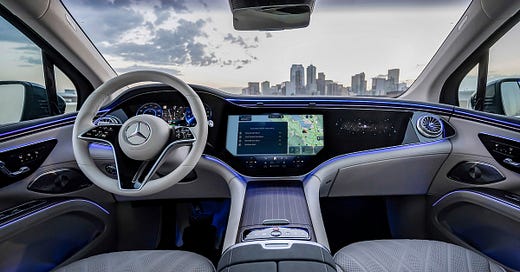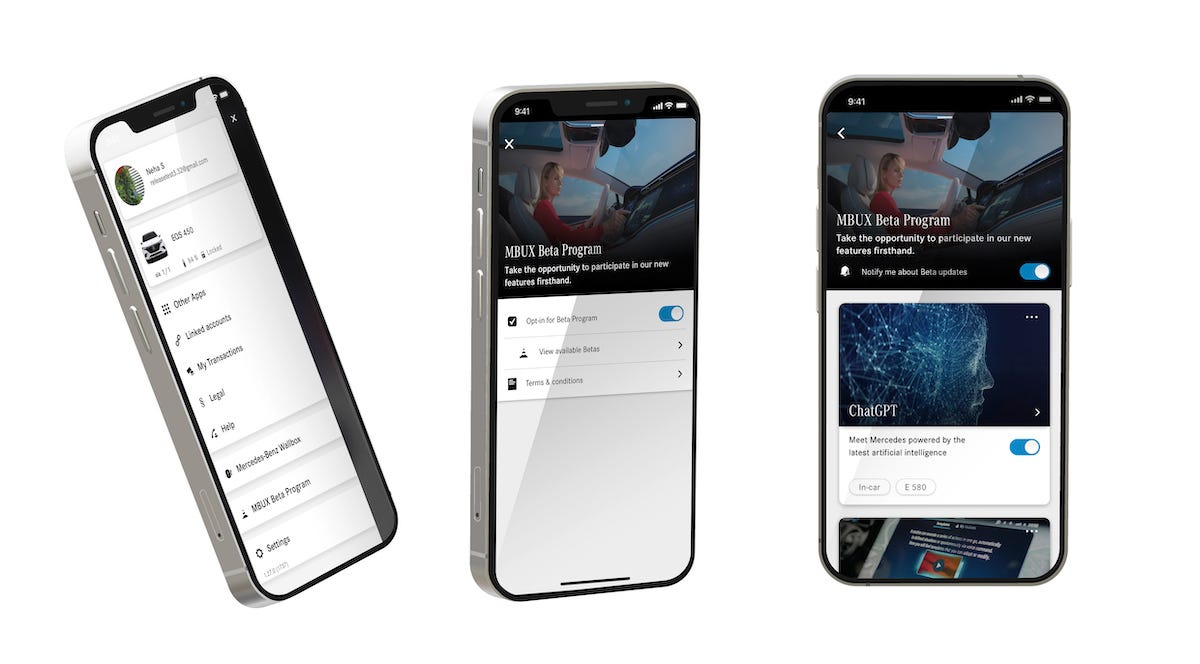Mercedes Adds ChatGPT to In-Car MBUX Assistant - Directly Confronts Alexa and SoundHound
U.S. program employs Azure OpenAI Services and separate data storage
Mercedes-Benz announced the availability of OpenAI’s ChatGPT for 900,000 U.S. customers through its MBUX in-car voice assistant solution. The new feature is a beta program that employs Azure OpenAI Service managed by Mercedes. The company announcement stressed data privacy safeguards.
Mercedes-Benz retains complete control over the IT processes in the background. The voice command data collected is stored in the Mercedes-Benz Intelligent Cloud, where it is anonymised and analysed.
Data protection is a top priority for Mercedes-Benz. Customers know at all times what information is collected and for what purpose, and they are free to make their own decisions.
…
“Our customers can always rely on us to ensure the best possible protection of their data privacy,” said Markus Schäfer, member of the board of management of Mercedes-Benz Group AG, chief technology officer, development & procurement.
What About Hallucinations?
Interestingly, Mercedes’ announcement did not include the typical disclaimers around incorrect information known as hallucinations or the potential for what is often called unsafe content. There was a more saccharine set of comments about “ChatGPT in line with Mercedes-Benz AI principles.”
Mercedes-Benz keeps a close eye on potential risks and the system will be continuously improved for the benefit of all customers. A responsible approach to generative AI solutions is top priority at Mercedes-Benz.
Many brands today are concerned about the potential for incorrect or inappropriate responses from ChatGPT. Mercedes is taking a risk that other brands will closely watch. With that said Mercedes has likely implemented its own set of guardrails to reduce the risk of inappropriate responses.
This is a key point to look for in future statements by Mercedes executives about the program results. Did they implement more extensive guardrails, and how well did they perform?
Accessing ChatGPT in Your Mercedes
Mercedes owners can activate ChatGPT functionality through the Mercedes Me app or by saying, “Hey Mercedes, I want to join the beta programme.” Either approach will initiate an over-the-air update to MBUX. You can see the models eligible for the beta access at the bottom of the page here.
The program begins tomorrow and is planned to run for 90 days. It is unclear whether it will be revoked at that point or move into production status.
No information was provided about expansion to other geographies. However, the announcement says that the beta program findings will influence the product updates and “the rollout strategy for large language models in more markets and languages.”
Voice First ChatGPT
ChatGPT through MBUX is designed for voice-first interaction. Users speak their requests similar to employing the assistants from Cerence, SoundHound, and Alexa through the car’s dashboard. The difference is that ChatGPT generates the response, which can be delivered through a mix of audio and on-screen content.
It does not appear that ChatGPT is used to control in-car functions such as climate and entertainment. However, MBUX has an arbitration layer that determines which assistant is best suited to respond to a user request. Cerence technology is used for speech recognition related to in-car controls and some travel-related content functions. SoundHound and Amazon’s Alexa are employed for many consumer-related tasks unrelated to driving. ChatGPT will be used to fill gaps that those solutions cannot fulfill and will certainly be usurping them for some requests.
ChatGPT’s scope of features through MBUX is unclear, but the announcement specifically mentioned navigation and weather requests. A demo by Electrek showed travel destination information surfaced through a ChatGPT response. These are features that Amazon Alexa, Cerence, and SoundHound could all answer today.
The Voice Assistant Wars Shift
Consumer voice assistants such as Alexa, Google Assistant, and Siri have fought for user attention and loyalty over several years. Their success has mostly been driven by the devices employed for the user request. However, these assistants and enterprise solutions, such as SoundHound and Cerence, all compete for primacy inside cars.
The integration of ChatGPT into Mercedes MBUX represents the first direct confrontation between the natural language understanding (NLU) driven assistants (i.e., Alexa, Cerence, Google Assistant, SoundHound, Siri) and their large large model (LLM) based competitors. If ChatGPT succeeds in displacing Alexa or SoundHound from regular use in Mercedes, it will mark a new phase in the voice assistant wars.
Everyone recognizes that ChatGPT and similar solutions are types of virtual assistants. While they remained primarily text-based, a direct comparison with the popular voice assistant features could be avoided. ChatGPT’s move into the car represents one of the three most important strongholds for voice assistants.
You should expect Amazon Alexa and Google Assistant to be updated with at least some LLM-based functionality in 2023. However, in the interim, the excitement around ChatGPT and its unique capabilities provides OpenAI with an opportunity to make inroads into several already competitive segments, including the car. Amazon and Google are in all of those segments to some degree. It looks like Microsoft, through OpenAI, will become another force in the assistant landscape in two ways:
As the branded ChatGPT persona
As the AI capability behind a brand’s custom (owned) assistant
Whether you call it a copilot or an assistant, the tech giants are eager to claim territory in the latest clash of attention technologies.
OpenAI Cuts Prices and Announces Most Significant Feature Expansion this Year
OpenAI announced new model updates today, lower prices, and the most significant feature expansion of the year. That means the new feature is even more significant than the GPT-3.5-turbo model, which offers third-party developers access to the same model that powers ChatGPT.
Apple's Reality Distortion Field - Go Long on VR. Ignore Generative AI.
[Steve] Jobs’s (in)famous ability to push people to do the impossible was dubbed by colleagues his Reality Distortion Field, after an episode of Star Trek in which aliens create a convincing alternative reality through sheer mental force. An early example was when Jobs was on the night shift at Atari and pushed Steve Wozniak to create a game called Brea…









It would be *awesome* if Google Assistant would integrate some LLM-based functionality in 2023. But they sunsetted Google Actions 2 days ago 😞Will they change their mind?